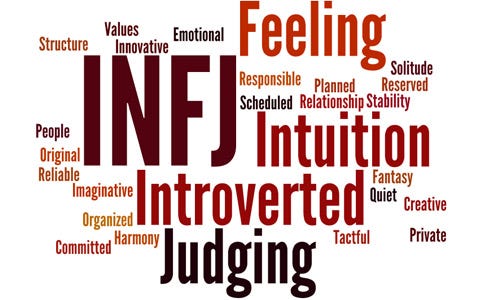What is the INFJ personality type?
The INFJ personality type is one of the rarest and most intriguing profiles in the Myers-Briggs Type Indicator (MBTI) system. Often referred to as “The Advocate,” INFJs are characterized by introversion, intuition, feeling, and judging—a combination that shapes their empathetic and idealistic nature.
INFJs are known for their strong sense of personal integrity and deep emotional insight. As creative nurturers, they have a natural ability to identify others’ emotions and motivations, often offering original solutions to complex problems. Despite their compassionate demeanor, INFJs tend to guard their thoughts and feelings, leading many to perceive them as mysterious and alluring.
This article explores the key traits, strengths, and challenges of the INFJ personality type, highlighting their approach to relationships, work, and personal growth.

Decoding INFJ: What Does It Stand For?
INFJ is an acronym that represents the following core characteristics:
- Introversion (I):
INFJs recharge by spending time alone, engaging in introspection, and reflecting on ideas. While they value social connections, solitude allows them to nurture their rich inner world. They often prefer deep, meaningful conversations over superficial chatter, making them exceptional listeners and advisors. - Intuition (N): Seeing Beyond the Surface
Guided by patterns and possibilities, INFJs focus on the big picture rather than immediate facts. They enjoy exploring abstract concepts and thinking about the future. Their ability to sense deeper meanings enables them to anticipate outcomes and navigate complex situations. - Feeling (F):
INFJs make decisions based on their values and emotions. They are highly empathetic, driven by a desire to help others and foster harmony. Their compassion and emotional intelligence allow them to connect deeply with people, but this also makes them sensitive to conflict and criticism. - Judging (J):
Advocates prefer planning and organization over spontaneity. They thrive in structured environments where they can set goals and follow through with determination. Their focus on purpose and precision often makes them perfectionists who set high standards for themselves.
10 Defining Traits of INFJs

INFJs are multi-dimensional individuals who balance idealism with practicality. Their key characteristics include:
- Empathy—INFJs excel at understanding unspoken emotions and providing comfort.
- Creativity—they are imaginative and often drawn to artistic expression like writing, music, and painting.
- Idealism—Advocates believe in making the world a better place and often advocate for social change.
- Integrity—INFJs have a strong moral compass and stand up for their principles, even in the face of opposition.
- Deep Connections – They value authentic relationships and prioritize emotional intimacy over superficial bonds.
- Insightfulness—INFJs have a keen sense of perception, enabling them to read people and situations accurately.
- Determination—Once committed to a goal, INFJs show unwavering focus and persistence.
- Intuition – They often rely on their gut instincts to guide decisions and assess people’s motives.
- Sensitivity—Advocates are emotionally receptive, but this can make them vulnerable to stress and criticism.
- Self-Reliance – Despite their social empathy, INFJs tend to be private and guarded, sharing their thoughts with only a select few.
INFJs in the Workplace: Strengths and Challenges

INFJs thrive in careers that align with their values and allow them to make a positive impact. They excel in roles that require creativity, empathy, and strategic thinking.
Key Strengths
- Creative Ideation—INFJs are skilled at generating original solutions to problems.
- Anticipating Needs – Their perceptive nature allows them to address concerns before they arise.
- Responsibility and Ethics: INFJs hold themselves to high standards and prioritize integrity.
Potential Challenges
- Perfectionism—Advocates often set unrealistic expectations, leading to stress and burnout.
- Emotional Sensitivity – They may internalize criticism, impacting their confidence and focus.
- Overcommitment—INFJs’ passion for helping others can lead to emotional exhaustion if boundaries are not established.
Best Careers for INFJs
INFJs are well-suited for professions that emphasize helping others and creative problem-solving, including:
- Counseling or Therapy
- Teaching
- Writing or Journalism
- Non-Profit Work
- Human Resources
- Art and Design
Building Meaningful Relationships with INFJs
INFJs are devoted partners and friends who prioritize emotional depth and trust in relationships. Their empathetic and nurturing qualities make them reliable confidants, but their guarded nature can create challenges for those seeking to understand them.

Tips for Connecting with INFJs
- Be authentic—INFJs value honesty and vulnerability. Share your true thoughts and emotions.
- Respect Their Space—Allow them time to recharge without taking it personally.
- Engage in Deep Conversations—Skip small talk and explore topics that spark meaningful discussions.
- Appreciate Their Efforts—INFJs often go above and beyond to support others. Acknowledge their contributions.
- Champion Their Dreams—Offer encouragement for their personal goals and aspirations.
- Avoid Harsh Criticism—Provide feedback gently to avoid overwhelming their sensitive side.
INFJs and the Pursuit of Purpose
For INFJs, life is about more than just meeting goals—it’s about creating meaningful change. Advocates are driven by a desire to make the world better, whether through volunteering, advocacy work, or personal growth.https://vocal.media/pride/10-secrets-of-the-infj-the-rarest-personality-type-in-the-world Their idealistic vision often fuels their determination, but it also poses risks of perfectionism and burnout.
To thrive, INFJs must balance their high expectations with self-compassion, recognizing that progress often comes in small steps. Setting realistic goals and seeking support can help them achieve long-term fulfillment without sacrificing their mental well-being.

The Rare Advocates for Change
The INFJ personality type is a fascinating blend of empathy, intuition, and idealism. Often described as quiet leaders, INFJs are guided by their values and motivated to create a positive impact. Their unique combination of insight and compassion makes them natural counselors, artists, and visionaries.
While INFJs face challenges like perfectionism and sensitivity, their strengths—such as creativity, determination, and emotional intelligence—allow them to inspire and uplift those around them. Whether in relationships, careers, or personal growth, INFJs leave a lasting impression as advocates for change and champions of authenticity.
By understanding and embracing the qualities of the INFJ personality type, we can appreciate their ability to nurture connections and envision a better world.












